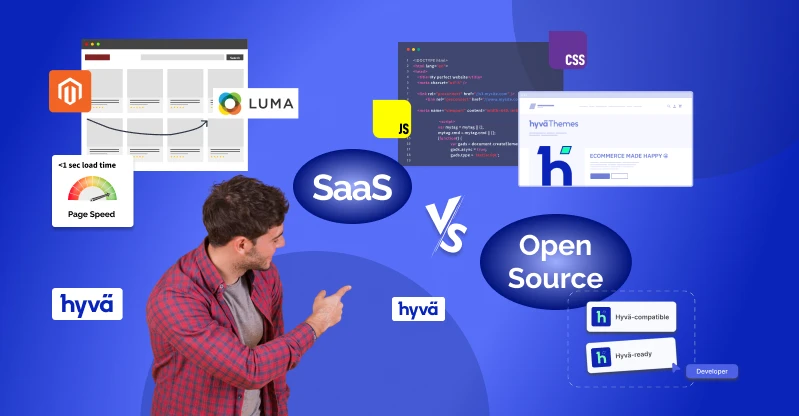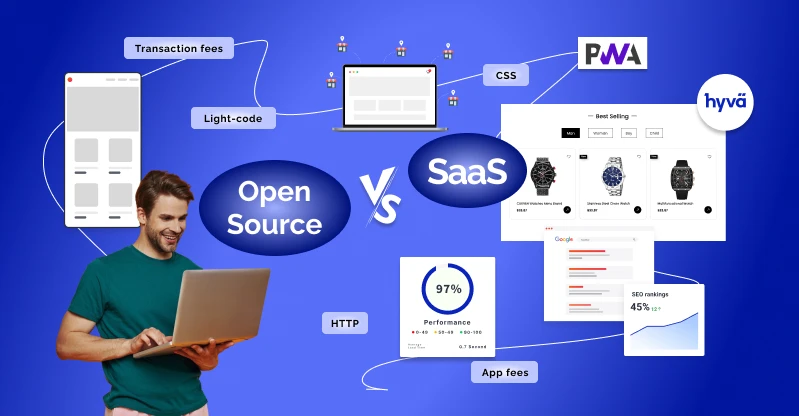SaaS Lock-in vs Open Source Freedom: Why Hyvä Commerce Wins

Table of Contents
In today’s fast-paced digital era, open-source flexibility vs. SaaS convenience has been the determining element in how eCommerce companies organize their future.
Whereas SaaS solutions offer convenience, scalability, and reduced entry costs, they also come with hidden trade-offs, less control, vendor lock-in, and additional recurring costs.
Meanwhile, open-source solutions like Hyvä Commerce are restoring businesses the control, speed, and innovation on their terms.
With increasingly more users looking for swift, high-performance, and fully customized eCommerce experiences worldwide, the Hyvä theme has been an evolutionary instrument for Magento store owners.
In this blog, we will discuss which one is better for your business, SaaS or open source. Let’s dive in.
The Global Shift Towards Open Source
Open-source technology, once relegated to a playpen for programmers, is now a firm foundation for stable enterprise systems.
The international open-source software market is valued at more than $90 billion in 2030, driven by companies that prefer to shake off their vendor chains and claim full sovereignty over their digital assets.
Open source allows brands to innovate based on their business model and not vice versa. Contrary to SaaS business models, where innovation is suppressed due to the confines of a platform, open-source technologies allow brands to innovate at their own speed, merge any system, and keep making adjustments without having to get approval from providers or changes in the roadmap.
Hyvä Commerce embodies the spirit of such freedom in practice. Built on Magento 2, it brings back agility, performance, and usability lost by most businesses with the bulky frontend of native Magento themes such as Luma.
Understanding SaaS Lock-in
SaaS offerings such as Shopify, BigCommerce, or Adobe Commerce Cloud have actually made eCommerce very easy to adopt, especially for small- and medium-sized companies. But ease of use hides an underlying problem, vendor lock-in.
Vendor lock-in is a situation where an organization over-represents reliance on the technology stack, infrastructure, or pricing plan of the SaaS vendor. Once entrenched deeply, it is hard, expensive, and time-consuming to move to another solution. It discourages innovation, customization, and economic mobility.
For instance, when a SaaS provider makes any change in price plan, API policy, or feature availability, the merchants can hardly have control over it.
They are forced to comply with provider alterations, generally at the expense of operational continuity or economics.
Meanwhile, the cumulative long-term cost of subscription charges, transactional charges, and reliance creates an overall financial weight, sometimes even more than the cost of keeping a bespoke open-source solution owned and hosted.
As opposed to that, open-source software such as Hyvä Commerce gives you control. Your code belongs to you, you decide your host plan, you tune performance, and you scale at your pace.
Hyvä Commerce: The Strength of Open Source Freedom
Hyvä Commerce is a new chapter in the Magento story, one of performance, simplicity, and freedom. Hand-built to replace Magento’s old frontend stack (Luma), Hyvä delivers a lean, modern, and high-performing experience without sacrificing flexibility.
In contrast to Luma, which is weighed down by many JavaScript libraries and a layer upon a layer of CSS, Hyvä takes advantage of Alpine.js and Tailwind CSS-light technologies that de-clutter the frontend to load pages fast and keep them running.
Therefore, websites built above Hyvä are likely to have a Google PageSpeed 90+, loading faster with lower bounce rates and better SEO visibility.
Second, Hyvä being open-source ensures that the merchants can extend, customize, and innovate freely. Through third-party integration, mobile responsiveness, or custom UI modification, developers are able to implement some changes without vendor lock-in.
Why Hyvä Commerce Replaces SaaS
Hyvä’s greatest value to global merchants is ownership and flexibility. SaaS products, as frictionless as they are, generally have limitations on customization, data control, and expansion in the future.
Businesses that must build differentiated digital experiences or support multiple regions suffer from those limitations.
With Hyvä, the power is once again in your own hands. You can tailor every single level of your store, push APIs deeper, and tune performance to any device or marketplace.

No surprise transaction fees or unwanted upgrades, just pure creative and functional mastery. Innovatively, Hyvä delivers industry-leading performance gains. 1-second page loading latency lowers conversions by 7% today. Speed is not a choice.
Hyvä’s stripped-down architecture prevents page bloat, allowing for near-instant rendering and improved Core Web Vitals, critical search engine ranking signals and user experience.
To the developers, Hyvä simplifies frontend complexity by 60% compared to Luma. These consequences are lower development cost, simpler maintenance, and accelerated time to market for new features or stores.
Open Source vs SaaS: A Comparative View
One needs to look beyond the cost of setup in an effort to comprehend the business benefit of Hyvä Commerce.
SaaS solutions, overall, are offering convenience, but convenience is paid for in the form of control and customizability. Businesses are subject to the mercy of the platform’s roadmap, security patches, and feature set.
Solutions like Hyvä are open-source and offer end-to-end visibility and community-inspired innovation.
With SaaS, the firm conforms to the platform. With open source, the platform conforms to the firm. This unyielding law is the reason why all the difference it makes in determining why forward-thinking retailers and global companies are increasingly turning to open-source solutions as a means of future-proofing their online commerce.
The Economic Advantage of Open Source
Cost-effectiveness is another category where Hyvä Commerce gets the award. SaaS plans may seem cheap at first, but over time, costs are sure to balloon exponentially when your business grows. Transaction fees, app fees, and add-ons used to come and accumulate.

Though there is a higher cost of development upfront with Hyvä, it is a long-term payoff that continues to pay dividends. You own the infrastructure and can scale it through traffic and geography without extra recurring platform fees.
It gives you more financial clarity and the overall cost of ownership in the long run. For international-serving, multi-currency, multi-store businesses, Hyvä’s flexibility equals local knowledge without additional SaaS charges. That means faster ROI and greater digital growth plan flexibility.
Much Better Performance and SEO
Most would say the best reason businesses across the globe are making the move to Hyvä Commerce is performance. Hyvä-driven websites naturally beat SaaS-driven websites for page speed, responsiveness, and Lighthouse scores.
Blazing-fast sites not only enhance user experience, there are actually quantifiable business outcomes. A gain of one second in page load speed has been shown to increase conversions by up to 15%. And to finish it all off, Google’s search algorithm now gives significant weight to Core Web Vitals, which means that Hyvä-built sites automatically have better SEO rankings and visibility.
With the combination of light-code, modern CSS frameworks, and HTTP request optimization, Hyvä introduces a responsive and fast frontend experience. This provides brands with the ability to deliver smooth, app-like experiences that SaaS storefronts just can’t.
Future-Proofing eCommerce with Hyvä
The future eCommerce landscape is changing at an incredible speed with headless architecture, voice search, and AI-based personalization defining the next decade. Hyvä’s open-source nature makes it easy for organizations to ride these waves of change.
SaaS platforms, by contrast, are generally not inclined toward embracing new technologies due to centralized control and strict update schedules.
Open-source solutions like Hyvä allow merchants to experiment with, implement, and innovate upon new breakthroughs, be it AI-powered recommendations, customized checkout procedures, or global PWA functionality.
That vision puts Hyvä merchants at the top of their game in a connected economy where innovation and adaptability are the most important aspects.
Conclusion
Where open-source freedom from SaaS lock-in is on the table, Hyvä Commerce gets the nod. It provides control, performance, and scalability that SaaS can only dream of.
With Hyvä, companies reclaim their digital world, locking in long-term growth, flexibility, and freedom.
In a time of global eCommerce where speed, freedom, and innovation are king, Hyvä Commerce has it all. Consult with our experts and implement Hyvä with ease.
FAQs
 Why is Hyvä essential for business growth?
Why is Hyvä essential for business growth?
Your shop is faster, Core Web Vitals are improved, and is a superior out-of-the-box user experience.
 How does Hyvä prevent SaaS lock-in?
How does Hyvä prevent SaaS lock-in?
It’s open-source, so you have the code, data, and hosting with complete freedom and control.
 Can I migrate my Luma theme to Hyvä?
Can I migrate my Luma theme to Hyvä?
Yes, migration is smooth and leads to a faster, cleaner, and more streamlined frontend.
 What will be the boost in performance?
What will be the boost in performance?
Hyvä sites consistently score higher than 90 on PageSpeed with much quicker page loading.




